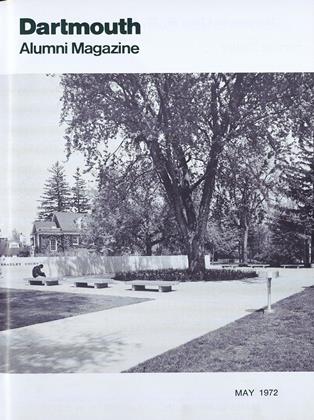Selected and with a note on "Protest" and an afterword on "Seals, Terns, Time."By Richard Eberhart '26 (Class of 1925Professor and Professor of English,Emeritus). Hanover: The University Pressof New England, 1971. Limited edition,200 copies, printed at The StinehourPress. $2.00.
This year's edition of the Dartmouth Poems includes a variety of subject matter. Perennial themes are nicely balanced by new ones. In the older, more reliable category, there is a good representation of youthful musings—most of them executed with restraint. Even in the few poems where anger or passion get the upper hand there is a sense of perspective and a maturity of outlook.
Thomas Kay's poems give a good idea of the scope of this collection. In his five poems the reader will find a portrait, a lover's song, the escape of a mental patient, and a fine poem on the subject of being alone. A fifth poem, "Scrounging," is a new theme, in the sense that it is not in the category of love, death, nature, etc.
Another new theme is dealt with by Don Nunes in "What Ever Happened to John" in which he describes "one of those awkward moments/that seize a dinner." The fact that the author did not answer the question posed by the title not only proves something about John, about the guests, and about the author; it also says something about the way we respond to life.
It is tempting to speculate how many of these students will continue to write poetry. Peter Kreckovic has the "feel" of a poet. His poems are integrated—part of his being and seeing. Another one who stands out in this collection is Stephen Hauser. "Moths," with its beautiful weaving of an old theme with a new one, is chilling to the last line where we are allowed to cool off and let the images burn. "A Swim" takes a calm look at suicide, equating the sun and the furnace in the expected manner but ending in four powerful lines. But to return to Kreckovic. In my opinion he is the best of the lot. To use his own words, I cannot describe it to you: The clarity, like glass, of the path of daisies in the meadow grasses, when the sky at the back has not one fold, one cloud.
Or the pale pink peace of the apple blossoms.
I cannot describe it to you.
The wind blows motion and all escapes.
Printed by the Stinehour Press, well known for its distinctive typography, Fifty-Six Dartmouth Poems has on its cover a simple but effective woodcut by Christopher Keith. As a bonus, the reader is treated to "A Note on Protest" by Richard Eberhart. Reprinted from the New York Quarterly, it should be the last word about the validity of political verse in literature. In brief, he asserts that all poetry is a form of protest.
A poet, Miss Beck, who has been associatedwith Ramon Guthrie, Thomas Vance, Alexander Laing, and other leaders in the Thursday Poets, Dartmouth College, is currentlyat work editing the Upper Valley Supplementof Granite, a New Hampshire quarterly.
 View Full Issue
View Full Issue
More From This Issue
-
 Feature
FeatureA Valedictorian Changes His Mind
May 1972 By ALBERT WILLIAM LEVI '32 -
 Feature
FeatureMorton, Kilmarx Elected Charter Trustees
May 1972 -
 Feature
FeatureCharlie Zimmerman: An Appreciation
May 1972 By GEORGE H. COLTON -
 Feature
FeatureThe Nautical Nyes
May 1972 By MARY ROSS -
 Feature
FeatureAmerican Musicologist
May 1972 -
 Feature
FeatureTrade Unionist
May 1972
DOROTHY BECK
Books
-
 Books
Books"Wholesome Marriage"
NOVEMBER 1927 -
 Books
BooksEUGEN ROSENSTOCK-HUESSY: BIBLIOGRAPHY-BIOGRAPHY.
December 1959 By ALEXANDER LAING '25 -
 Books
BooksNOTES FROM A BOTTLE FOUND ON THE BEACH AT CARMEL.
APRIL 1964 By ALEXANDER LAING '25 -
 Books
BooksTHE STORY OF SAN MICHELE
January, 1930 By H. E. West -
 Books
BooksDEMOCRACY: MAN'S GREAT OPPORTUNITY AND THE COMMON CAUSE COLLECTIVISM: MENACE OR CHALLENGE
January 1950 By Robert B. Dishman -
 Books
BooksCOMMUNICABLE DISEASE CONTROL,
March 1942 By Rolf C. Syvertsen, M.D. '18



